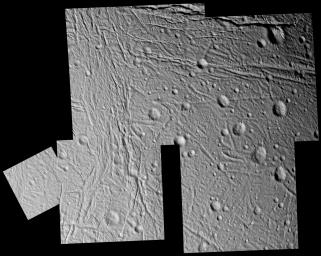The complex history of Enceladus' surface is revealed in great detail in this mosaic of images taken during Cassini's closest encounter with this intriguing icy moon.
Fractures are nearly ubiquitous in this terrain, cutting across each other and across impact craters. Scientists can use the relationships between different features to determine the order in which they formed, thereby unraveling the moon's past. For example, almost all the craters in this mosaic have fractures running through their rims and floors, indicating that the craters formed first. This means that Enceladus has been geologically active relatively recently, especially compared to some of its neighbors in the Saturn system.
There is an impressive variety of fractures visible here--from the wide east-west rifts near the upper left of the mosaic to the very fine north-south fractures in the center (which are approximately 100 to 400 meters, or 330 to 1,300 feet, across). Due to the complexity of this terrain, the task of unraveling Enceladus' history promises to be a worthy challenge for planetary scientists.
The images in this mosaic were taken on March 9, 2005, in visible green light with the Cassini spacecraft narrow-angle camera at distances ranging from approximately 13,000 to 5,200 kilometers (8,000 to 3,200 miles) from Enceladus and at a Sun-Enceladus-spacecraft, or phase, angle ranging from 44 to 38 degrees. Resolution in the original images ranges from about 80 to 30 meters (260 to 100 feet) per pixel.
The Cassini-Huygens mission is a cooperative project of NASA, the European Space Agency and the Italian Space Agency. The Jet Propulsion Laboratory, a division of the California Institute of Technology in Pasadena, manages the mission for NASA's Science Mission Directorate, Washington, D.C. The Cassini orbiter and its two onboard cameras were designed, developed and assembled at JPL. The imaging team is based at the Space Science Institute, Boulder, Colo.
For more information about the Cassini-Huygens mission, visit http://saturn.jpl.nasa.gov and the Cassini imaging team home page, http://ciclops.org.

 Planetary Data System
Planetary Data System












